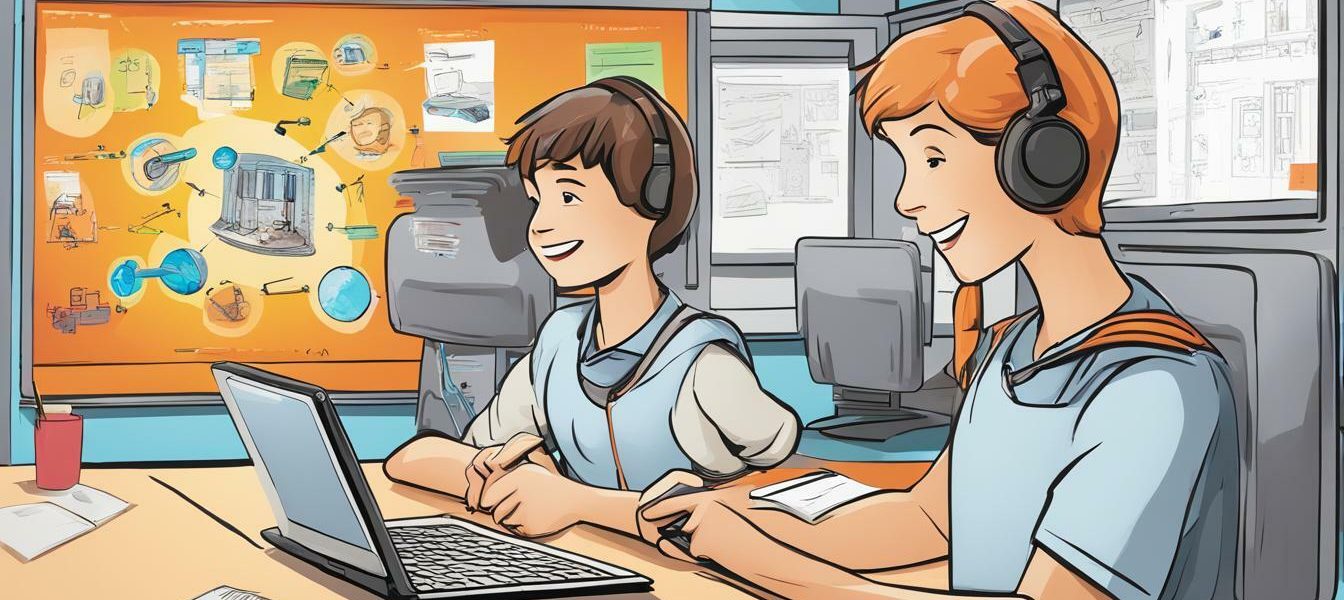
What Is ISS For School
As a student, you may have heard about ISS or In-School Suspension. ISS is a disciplinary measure that schools use to address inappropriate behavior and promote positive conduct. In this article, we will break down what ISS is, how it works, and its benefits for students and schools.
Key Takeaways:
- ISS is an in-school disciplinary measure used to promote positive conduct and address inappropriate behavior.
- ISS aims to provide students with an opportunity to reflect on their actions and catch up on missed work.
Understanding In-School Suspension (ISS)
When students violate a school’s code of conduct, they may be subject to disciplinary action, including in-school suspension (ISS). ISS is a form of punishment that removes students from their regular classroom environment and places them in a designated location within the school.
While in ISS, students are expected to complete academic work assigned by their teachers and follow a set of rules and procedures established by the school. ISS is designed to help students reflect on their behavior and encourage them to make positive changes that will allow them to succeed academically and socially.
The decision to assign ISS to a student is typically made by a school administrator or disciplinary committee. Schools may have different criteria for assigning ISS, but generally, it is reserved for more serious offenses that do not warrant out-of-school suspension or expulsion.
The goals of ISS include providing a safe and structured environment for students to reflect on their behavior, preventing further disruptions to the learning environment, and giving students an opportunity to catch up on missed work. By separating students from their peers and regular classroom routine, ISS can also serve as a deterrent for future misconduct.
Examples of ISS Offenses
Actions that may result in ISS vary between schools, but examples include:
- Disrespectful or disruptive behavior in the classroom
- Repeated tardiness or truancy
- Bullying or harassment of other students
- Damage to school property
- Use or possession of drugs or alcohol on school property
When a student is assigned ISS, they are typically escorted to the ISS room or area where they will spend the day. The length of time that a student remains in ISS can vary, depending on the severity of the offense.
During their time in ISS, students must comply with the rules and procedures set by the school. This may include wearing a uniform, following a set schedule, and reporting to a designated staff member for assignments and supervision.
If a student violates the rules of ISS or fails to complete assigned work, they may face additional disciplinary action, such as extended ISS or out-of-school suspension.
The ISS Program for Students
In-School Suspension (ISS) is a disciplinary measure used by schools to address student misbehavior while keeping them on campus. Students in ISS are typically removed from their normal classes and placed in a separate area within the school where they must complete academic work and adhere to strict rules and expectations. The goal of the ISS program is to provide a structured environment that allows students to reflect on their actions, make amends, and focus on learning.
The process for assigning a student to ISS can vary by school and state, but generally, it involves a disciplinary infraction that warrants a removal from regular classes. Students may be referred to ISS for incidents such as fighting, disruptive behavior, or repeated classroom violations. While in ISS, students are expected to complete any academic work assigned by their teachers and follow a set of rules established by the school. The duration of an ISS program can also vary depending on the offense committed and the school policies.
Benefits of ISS in Schools
In-School Suspension (ISS) can be a powerful tool to improve student behavior and promote a positive learning environment. While ISS is often viewed as a disciplinary measure, it can also provide important benefits that help students succeed.
One of the main benefits of ISS is that it can promote behavior change. By providing students with a structured and supervised environment, ISS gives students the opportunity to reflect on their actions and make positive changes to their behavior. Additionally, the consequences of ISS can serve as a deterrent to future misbehavior, as students who experience ISS may be less likely to engage in disruptive behavior again.
ISS can also provide an opportunity for students to catch up on missed work. Since ISS involves removing students from their regular classes, students may have additional time to work on class assignments or receive individualized support from teachers. This can be especially beneficial for students who are struggling academically, as ISS provides a structured and supportive environment to help them succeed.
Finally, ISS can help to create a safe and inclusive school culture. By addressing disruptive behavior and promoting positive behavior change, ISS can help to reduce incidents of bullying, harassment, and other negative behaviors that can harm students and create an unsafe learning environment.
How ISS Works in School
ISS operates differently in various schools, but typically, the program involves assigning a student to a designated room that is separate from their regular class. The student spends the entire school day in the ISS room for a set number of consecutive days determined by the school’s policy. During this time, the student is expected to complete their schoolwork and any assignments provided by the teacher.
Students in ISS are typically under close supervision, and their behavior is monitored throughout the day by a teacher or staff member assigned to the program. The goal is to provide a structured and supportive environment that encourages students to reflect on their actions and make positive changes.
While in ISS, students may have limited contact with their peers, depending on the school’s policy. Some schools allow students to eat lunch with their classmates, whereas others require students to eat in the ISS room. Students must follow all school rules and guidelines while in ISS, and failure to do so may result in additional consequences.
The Role of Teachers and Staff
Teachers and staff play a crucial role in managing ISS and ensuring its effectiveness. They are responsible for overseeing students in the program and providing them with academic and emotional support. Teachers may assign work and provide guidance on assignments, while staff members monitor student behavior and enforce school rules.
Teachers and staff must also communicate with each other to ensure consistency in expectations and consequences. They may hold regular meetings to discuss the program’s progress, identify areas for improvement, and make any necessary adjustments.
Tracking Progress and Success
Tracking student progress is crucial for evaluating the effectiveness of ISS and making any necessary adjustments to the program. Teachers and staff may keep records of student behavior and academic performance while in ISS, using these to assess the program’s impact on students’ behavior and academic achievement.
Some schools also conduct surveys or solicit feedback from students and parents to gain insight into their experiences with the ISS program. By tracking progress and success, schools can continually improve their ISS policies and provide students with the support they need to succeed.
ISS Policy for Schools
Having a well-defined ISS policy is crucial for ensuring consistency and fairness in disciplinary measures. The policy should outline clear guidelines for determining offenses that warrant ISS, consequences for students, and the appeal process.
When creating an ISS policy, it is important to consider the unique needs and circumstances of the school community. The policy should be reviewed regularly to ensure it remains relevant and effective.
| Key Elements of an ISS Policy |
|---|
| 1. Criteria for Assigning ISS |
| The policy should define what types of behaviors or offenses warrant ISS. This can include repeated disruptive behavior, insubordination, or physical altercations. |
| 2. Duration of ISS |
| The policy should specify the length of time students will be in ISS and whether there is an opportunity for early release. This information should be communicated clearly to students and parents. |
| 3. Consequences for Violations |
| The policy should outline the consequences for violating ISS rules, such as extending the length of the program or additional disciplinary measures. |
| 4. Appeal Process |
| Students and parents should have a clear understanding of the appeal process and their rights in the event of a dispute. |
By creating and implementing a clear and effective ISS policy, schools can ensure that disciplinary measures are administered fairly and consistently, and support students in their academic and behavioral growth.
Guidelines for Managing ISS in Schools
Managing ISS in schools can be a challenging task, but with the right guidelines and strategies, it is possible to create a supportive and productive environment for students. Here are some effective guidelines for managing ISS in schools:
1. Establish Clear Rules and Expectations
It is important to establish clear rules and expectations for students in ISS. Ensure that students understand why they are in ISS and what is expected of them during their time there. Provide them with a list of rules and consequences for not following them. Make sure that the rules are fair and consistent for all students.
2. Provide a Structured Environment
ISS should be a structured environment where students can work on their assignments and catch up on missed work. Provide students with a quiet and comfortable workspace where they can focus on their studies. Consider implementing a schedule that includes study time, break time, and a designated lunch period.
3. Offer Supportive Services
ISS can be a difficult time for students, and it is important to offer them supportive services. Consider having a school counselor or social worker available to talk to students while they are in ISS. This can help students manage their emotions and address any underlying issues that may contribute to their behavior.
4. Communicate with Teachers and Parents
It is important to communicate with teachers and parents about students who are in ISS. Teachers can provide assignments and work for students to complete while they are in ISS, and parents can be informed about their child’s behavior and progress in ISS. Maintaining good communication can help to ensure that students receive the support they need to succeed.
5. Focus on Positive Reinforcement
While ISS is a disciplinary measure, it is important to focus on positive reinforcement when possible. Recognize and celebrate the successes of students in ISS, whether it is completing an assignment or improving their behavior. This can help to motivate students and improve their overall attitude towards school.
By following these guidelines, schools can effectively manage ISS and provide a supportive and productive environment for students.
Reducing ISS Incidents in Schools
While ISS can be an effective disciplinary measure, the goal for schools should always be to prevent disruptive behavior before it occurs. By creating a positive and nurturing school culture, educators can reduce the need for ISS and promote better learning outcomes for all students.
Here are some tips and strategies that schools can implement to reduce ISS incidents:
- Develop a clear and consistent code of conduct that is understood by all students and staff. This should outline behavioral expectations and the consequences for violating them.
- Implement a school-wide positive behavior support program that focuses on rewarding good behavior rather than just punishing bad behavior.
- Provide students with appropriate emotional and mental health support services, including counseling and access to community resources.
- Train teachers and staff in conflict resolution and de-escalation techniques, as well as in how to identify and address underlying issues that contribute to disruptive behavior.
- Involve parents and families in the school community to create a sense of shared responsibility for preventing disruptive behavior.
By taking a proactive approach to discipline and creating a supportive school environment, educators can reduce the need for ISS and help students thrive. However, it’s important to remember that ISS may still be necessary in some cases, and having a well-defined ISS policy in place can help ensure that it is administered fairly and effectively.
Supporting Students During and After ISS
While in ISS, students may feel isolated from their peers and disconnected from the classroom experience. It is important for educators and counselors to provide support during and after a student’s time in ISS.
During ISS, teachers and support staff should monitor students regularly and provide academic assistance when needed. This may include helping students with missed assignments, providing one-on-one instruction, or offering extra guidance and encouragement. Additionally, counselors should be available to address any emotional or behavioral concerns that may arise during the student’s time in ISS.
After a student returns to regular classes, it is important to continue providing support and monitoring their progress. Teachers should work with the student to catch up on missed work and ensure they understand the material covered during their absence. Counselors should also check in with the student to address any lingering emotional or behavioral issues and offer ongoing support as needed.
Providing support during and after ISS can help students successfully reintegrate back into the classroom and minimize the risk of future disciplinary issues.
Evaluating the Effectiveness of ISS
Evaluating the effectiveness of an ISS program is crucial to ensure that it is meeting its intended purpose. There are different evaluation methods and tools that schools can use to measure the impact of ISS on students’ behavior and academic performance.
One way to evaluate the effectiveness of ISS is to analyze student behavior before and after their time in ISS. This can involve tracking the number of disciplinary incidents or referrals that a student receives before and after their ISS experience. If there is a significant reduction in disciplinary incidents, it can be an indicator that the ISS program is effective in promoting behavior change.
Another evaluation method is to collect feedback from students who have completed the ISS program. This feedback can provide insights into the student experience and highlight areas where the program can be improved. Schools can use surveys or focus groups to gather this feedback.
Academic performance is another important aspect to consider when evaluating the effectiveness of ISS. Schools can compare the grades of students who have completed ISS to their grades prior to their ISS experience. If there is a noticeable improvement in grades, it can suggest that the program is effective in helping students catch up on missed work and improve their academic performance.
Overall, evaluating the effectiveness of ISS is essential to ensure that it is an impactful and beneficial disciplinary measure for students. Schools should regularly review and assess their ISS program to identify areas for improvement and make necessary adjustments.
Conclusion
In-School Suspension (ISS) is an effective disciplinary measure that allows schools to support students as they learn from their mistakes and work towards positive behavior change. By providing a structured environment for reflection and catch-up work, ISS can help students develop essential skills in self-regulation and accountability.
However, it is important for schools to have a clear policy on ISS, as well as guidelines for managing the program effectively. Proactive approaches to reducing incidents of ISS, promoting positive behavior, and creating a supportive school culture can also play a critical role in ensuring the success of this disciplinary measure.
As schools evaluate the effectiveness of ISS, it is essential to remember that the ultimate goal is not simply to punish students, but to help them grow and succeed academically and socially. By providing support during and after ISS and keeping lines of communication open between students, parents, and school staff, schools can create a positive and productive learning environment for all students.



